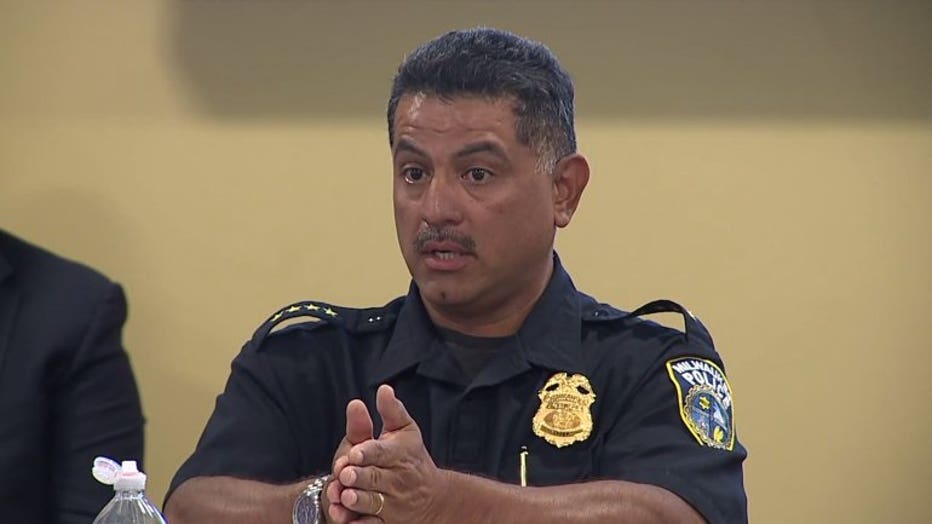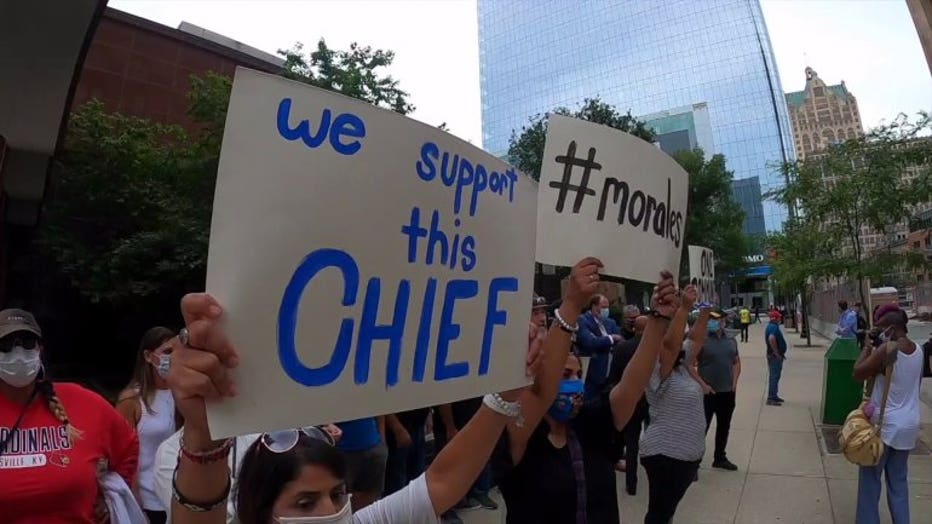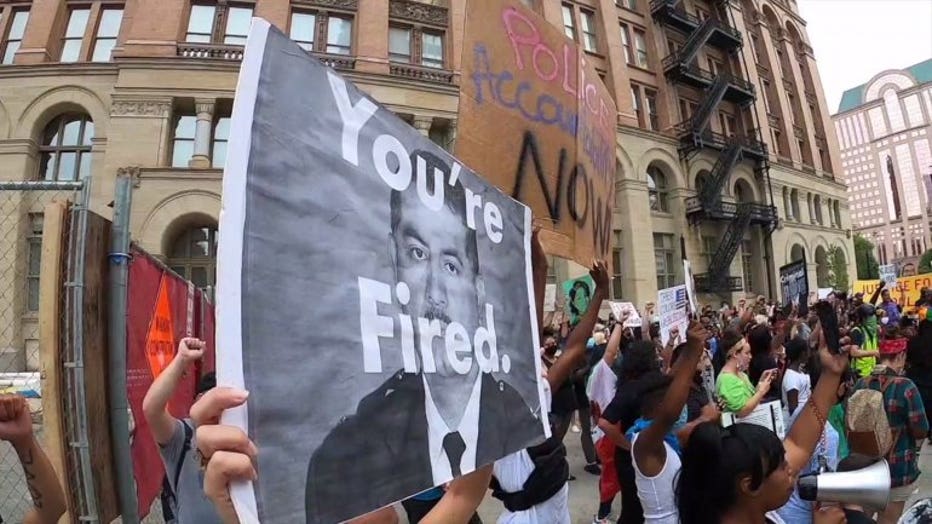Mayor Barrett, with power to overrule, 'reviewing' 11 directives issued by FPC for Chief Morales
MILWAUKEE -- The office of Milwaukee Mayor Tom Barrett, who has the power to overrule the 11 directives handed down for Milwaukee Police Chief Alfonso Morales in a special session Monday evening, July 20 by the Fire and Police Commission said Tuesday, "We are reviewing the directives and their intent at this time.”
"A chief given a directive, and must implement directive unless overruled by mayor," said FPC Executive Director Griselda Aldrete during Monday's special session.
CLICK HERE for the signed list of directives released by the FPC.
The 11 directives are as follows:
1. The Board of Fire Police Commission requests authority to obtain department records, as part of policy review involving the following incidents and individuals:
2. Community-oriented policing
Directing the chief to prepare and present promptly a draft of a community-orienting policy and standard operating procedure in collaboration with community leaders and the Milwaukee Common Council at the next Policy and Standards Committee meeting. Deadline July 30.
3. Create a discipline matrix to accompany the Code of Conduct
Deadline Aug. 6.
4. COVID-19 mitigation plans and updates
Policy should be presented to the Policy and Standards Committee July 30.
5. Reappointment contingency update
Provide a full update with the terms of reappointment outlined by Commissioner Soler in December 2019. Provide statistics on crime and arrest data, how MPD is integrating community policing into their policies, MPD pursuit policy and how they use technology to avoid complaints, reckless driving efforts that MPD has in place, 911 center and the stats related to turnover and response rates, CAD and technology updates, keep the board updated on retirements and the plans to replace staff, address issues with policies that have been implemented and report if they are working or not working, management of overtime of the Milwaukee Police Department, be accessible to the commissioners with an open door policy, work with the community to work with supporters and opponents. be transparent while working with the board.
This report should be in writing within 15 days.
6. Promotional process
Provide a vetting and full explanation of the methodology, process, all candidate information for promoting candidates in the ranks of assistant chief, captain lieutenant and emergency management communications manager positions. An updated Milwaukee PD organizational structure should be amended and provided to include names of individuals currently in these ranks. Deadline Aug. 4.
7. Responsiveness
Directing the chief to comply with all requests from the FPC within 7 days of receipt or in accordance with the deadlines set fourth by the executive director and or the board. An amendment will be made to SOP 265 open records at the next Policy and Standards Committee meeting July 30 to make this policy on the SOP.
8. Open records
Directing the chief to order a policy for the department to comply with any and all FPC open record requests under all circumstances. Amendment will be made to SOP 265 at the next Policy and Standards Committee meeting July 30.
9. Chief must appear virtually or in person at all FPC meetings
Must give 24-hour notice if he can't make it and must send a rep on his behalf.
10: Open communication
Chief is directed to copy the executive director on any and all communication made to the FPC to ensure transparency.
11. Immediate status briefing

Milwaukee Police Chief Alfonso Morales
The chief, as head of the department, will immediately provide written updates on MPD compliance on these directives at the next FPC meeting on Aug 6., and should be prepared to respond to questions made from the board.
Chief Morales and his team said Monday night they will comply to the best of their ability to those directives they find legitimate and warranted. The chief did not answer questions Monday evening; his attorney calling the FPC action unprecedented, an "aggressive response" and a distraction from problems among the board.
"I think this is a very aggressive response by the FPC to a bunch of problems that are visiting their house, and they are distracting from the problems that exist within that commission," said Frank Gimbel, Chief Morales' attorney.
The chief's team said it's hard not to believe the case against Morales is political and personal, a claim Aldrete rejected.
"Absolutely not," said Aldrete. "This is part of our oversight capacity. I'm the executive director. My post is nearly ending, and I only hope our city is in good hands going forward."

Supporters, including the police union, said no chief in recent times has been handed so many directives at once.
"My guess is that’s what the FPC’s ultimate goal is -- to have him fired," said Dale Bormann, president of the Milwaukee Police Association.
Voces de la Frontera, a group that called for Morales' termination Monday, said the directives promote transparency, accountability and community policing.
"I think some of them are very important," said Christine Neumann-Ortiz, executive director of Voces de la Frontera. "I think all of the directives were actually quite good."
The chief and his team said Monday night they've already complied with some of the directives. Aldrete would not comment on whether she had received them.
The FPC is facing shakeups of its own -- with Chairman Steven DeVougas under investigation for a potential ethics violation -- something community leaders said needs to be looked into.
"(The FPC) needs to be strengthened," said Neumann-Ortiz. "Its independence, its transparency, its representation."

The Milwaukee Police Department issued this statement Tuesday:
"Chief Morales, and the entire Milwaukee Police Department, will comply with this extensive directive from the Fire & Police Commission. MPD’s top priority remains addressing violent crime and ensuring that next month’s DNC is a safe event for all visitors and participants."
Meanwhile, Jim Palmer, the executive director of the Wisconsin Professional Police Association released this statement to FOX6 News:
"While the WPPA is Wisconsin’s largest law enforcement group, we do not represent the officers in Milwaukee. Nonetheless, we have a great deal of experience with the laws and dynamics related to police oversight generally, and with police and fire commissions specifically.
The orders issued to Chief Morales yesterday by the Milwaukee Fire and Police Commission, while within its statutory authority, are highly unusual, particularly in light of the legitimate criticisms that have been levied against that body. The FPC has suffered from a high turnover and shortage of staff, internal political strife, and the fact that two board seats have remained inexplicably vacant. As a result of these valid shortcomings and others, the board has been rendered unable to fulfill its responsibilities to the police department and the community it serves. The FPC’s failure to approve promotions, for instance, has created vacancies within the police department that threaten its ability to comply with an agreement stemming from the 2018 lawsuit by the ACLU of Wisconsin over policing practices that preceded Morales’ tenure as chief. In addition, recent ethical concerns and complaints regarding the FPC president have further undermined the board’s ability to discharge its important oversight duties.
In the face of these significant shortcomings, it was disappointing to see the FPC issue a lengthy list of unprecedented directives with what appears to be a strict and unrealistic deadline. In doing so without any recognition of its own shortcomings, the action by the FPC appears to be little more than an attempt to shift the public attention away from its own impotence.
The challenges facing law enforcement in the current environment are significant, and the inability of the FPC to get its own house in order has only served to exacerbate those difficulties and undermine the ability of the chief, his department, and the officers that serve Milwaukee to do their jobs effectively. The FPC has an important role to play in strengthening the relationship between MPD and the community, but it appears determined to side-step that responsibility in favor of political expediency and with the intent of shedding any responsibility for the current state of affairs. Chief Morales, the officers in Milwaukee, and the general public all deserve better."
The American Civil Liberties Union of Wisconsin issued this statement on the FPC's directives and "its policy to discontinue the use of tear gas and pepper spray used by the MPD in recent protests, work with the Community Collaborative Committee and others to develop a community policing policy, and provide an update on MPD's compliance with the stop-and-frisk settlement agreement:"
“This is a tumultuous time in not only the Milwaukee Police Department, but in police departments throughout the country. In order for police relations with the community to improve, we have to break with unhelpful police practices that we’ve seen in the past,” said Chris Ott, ACLU of Wisconsin executive director. “The FPC was right to order a change in policy to discontinue tear gas and pepper spray after a large volume of both were used against protestors throughout the city last month. Accountability, and a new policy, should be in place going forward to ensure that protestors are not subjected to harmful police practices when exercising their First Amendment right to protest.”
“The Milwaukee Fire and Police Commission also required Morales to provide a full update on the department’s compliance with the City’s 2018 settlement in the Stop and Frisk lawsuit. Our clients brought this lawsuit because racial profiling is both unjust and dangerous. No one should be stopped and searched by police because of their race, and recent months have shown terrible new examples of how encounters with police that should never have happened in the first place can go violently and fatally wrong,” Ott said.
“It is especially important now for Milwaukee to prevent this from happening: for the safety and well being of Milwaukee residents, especially African-Americans and other people of color,” Ott stated. “The community’s input should be considered when developing policies and policing strategies. This collaboration could go a long way to rebuild trust.”

